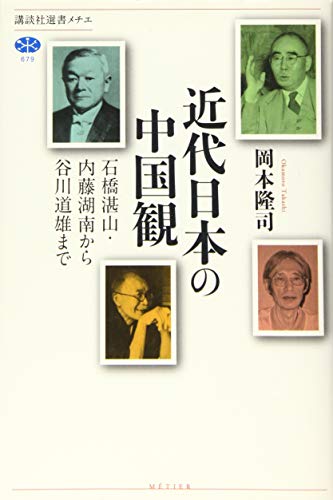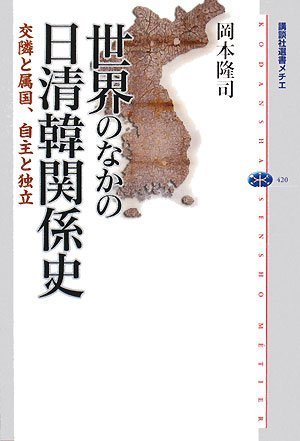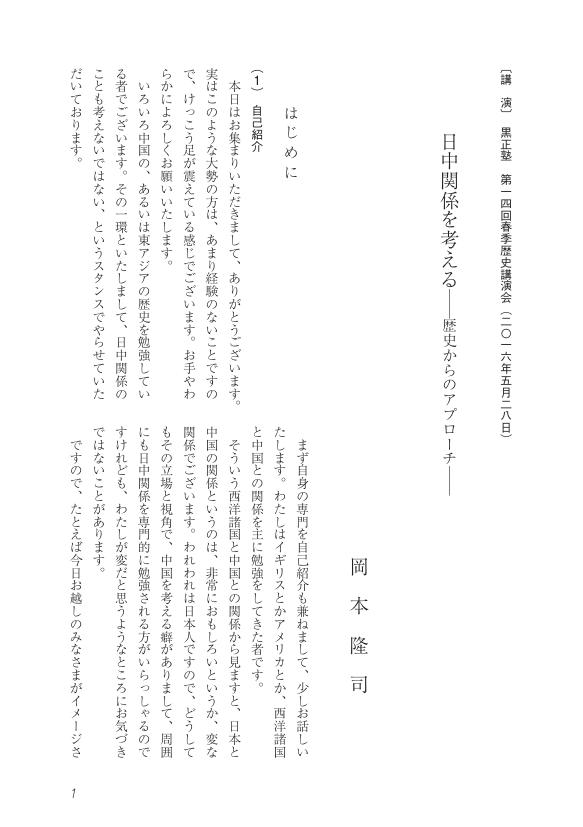- 著者
- 岡本 隆司
- 出版者
- 校倉書房
- 雑誌
- 歴史評論 (ISSN:03868907)
- 巻号頁・発行日
- no.799, pp.37-46, 2016-11
8 0 0 0 IR 清末民国と塩税
- 著者
- 岡本 隆司
- 出版者
- 東洋史研究會
- 雑誌
- 東洋史研究 (ISSN:03869059)
- 巻号頁・発行日
- vol.58, no.1, pp.84-117, 1999-06
3 0 0 0 IR 大君と自主と独立 : 近代朝鮮をめぐる翻訳概念と国際関係 (特集 近代日本の外交)
- 著者
- 岡本 隆司
- 出版者
- 慶應義塾福沢研究センター
- 雑誌
- 近代日本研究 (ISSN:09114181)
- 巻号頁・発行日
- no.28, pp.143-175, 2011
特集1 : 近代日本の外交はじめに一 「大君」の消滅二 明治維新と「独立」概念三 江華条約と「自主」概念四 「自主」の分裂五 朝鮮における「自主」の重層化六 「自主」の一元化まとめ
3 0 0 0 近代日本がみつめた中国(1)日中関係と石橋湛山
- 著者
- 岡本 隆司
- 出版者
- 講談社
- 雑誌
- 本 (ISSN:03850366)
- 巻号頁・発行日
- vol.39, no.9, pp.6-13, 2014-09
3 0 0 0 OA 東アジアにおける「冊封・朝貢」の終焉とその記憶の形成過程
2 0 0 0 IR 「社会科学と人文学の対話」によせて
- 著者
- 岡本 隆司
- 出版者
- 東京大学連携研究機構ヒューマニティーズセンター
- 雑誌
- Humanities Center Booklet (ISSN:24349852)
- 巻号頁・発行日
- no.4, pp.5-10, 2020-07-10
「社会科学と人文学の対話――『国書がむすぶ外交』総論を素材に」東京大学ヒューマニティーズセンター オープンセミナー特別回より
2 0 0 0 近代日本の中国観 : 石橋湛山・内藤湖南から谷川道雄まで
2 0 0 0 OA 淸末民國と鹽税
- 著者
- 岡本 隆司
- 出版者
- 東洋史研究會
- 雑誌
- 東洋史研究 (ISSN:03869059)
- 巻号頁・発行日
- vol.58, no.1, pp.84-117, 1999-06-30
- 著者
- 岡本 隆司
- 出版者
- 東洋史研究会
- 雑誌
- 東洋史研究 (ISSN:03869059)
- 巻号頁・発行日
- vol.73, no.4, pp.611-645, 2015-03
2 0 0 0 IR モンゴル「獨立」問題と漢語概念 : キャフタ協定にいたる交渉を中心に
- 著者
- 岡本 隆司
- 出版者
- 東洋史研究会
- 雑誌
- 東洋史研究 (ISSN:03869059)
- 巻号頁・発行日
- vol.73, no.4, pp.611-645, 2015-03
This paper aims to examine the diplomatic negotiations relating to Mongolia's "independence" and international status after the 1911 Revolution and clarifying the Chinese notion of the world order and its transformation. I first trace the process of the tripartite negotiations between Mongolia, Russia and China from the conclusion of the Russo-Mongolian Agreement in 1912 to the Kiakhta Treaty in 1915. Secondly, I focus on the language and actions of the Chinese and reexamine the correlation between Chinese interests and wording in the negotiations by chiefly conducting an special analysis of some Western concepts translated into Chinese, such as zizhu 自主/zizhi 自治[independence/autonomy], zhuquan 主權/zongzhuquan 宗主權[sovereignty/suzerainty], lingtu 領土/fanshu 藩屬[territory/ dependency], and so on. As a result, I clarify that although Russia and China recognized Outer Mongoliaʼs autonomy as a Chinese territory and Mongolia recognized Chinaʼs suzerainty in the treaty, both the Chinese and the Mongols were dissatisfied and imposed their own interpretations on such concepts as zongzhuquan [suzerainty], zizhi [autonomy], and so on. In addition, I point out that this not only necessitated Chinaʼs investiture, cefeng 册封, of "Bogd Khaan" and the abolition of Outer Mongoliaʼs autonomy only a few years later in 1919, but also brought about the conditions leading to the Mongolian Revolution in 1921. This historical process cannot be said to be unrelated to the concepts of "sovereignty" and "territorial integrity" that govern foreign relations in contemporary China. It can be regarded as a key source in examining the formation of nationalism in China and surrounding countries.
1 0 0 0 世界のなかの日清韓関係史 : 交隣と属国、自主と独立
1 0 0 0 世界史と中国史 : グローバル・ヒストリーとアジア史と漢語概念
- 著者
- 岡本 隆司
- 出版者
- 七隈史学会
- 雑誌
- 七隈史学 (ISSN:13481304)
- 巻号頁・発行日
- no.22, pp.1-11, 2020-03
1 0 0 0 OA 日中関係を考える 歴史からのアプローチ
- 著者
- 岡本 隆司
- 出版者
- 大阪経済大学日本経済史研究所
- 雑誌
- 経済史研究 (ISSN:1344803X)
- 巻号頁・発行日
- vol.21, pp.1-34, 2018-01-25 (Released:2018-07-20)
- 著者
- 岡本 隆司
- 出版者
- 績文堂出版
- 雑誌
- 歴史学研究 = Journal of historical studies (ISSN:03869237)
- 巻号頁・発行日
- no.989, pp.186-196, 2019-10
1 0 0 0 IR 「朝貢」と「互市」と海関
- 著者
- 岡本 隆司
- 出版者
- 史学研究会 (京都大学大学院文学研究科内)
- 雑誌
- 史林 (ISSN:03869369)
- 巻号頁・発行日
- vol.90, no.5, pp.749-771, 2007-09
1 0 0 0 OA 清仏戦争への道 : 李・フルニエ協定の成立と和平の挫折
- 著者
- 岡本 隆司 Takashi OKAMOTO
- 雑誌
- 京都府立大学学術報告. 人文・社会 = The scientific reports of Kyoto Prefectural University. Humanities and social science (ISSN:13433946)
- 巻号頁・発行日
- vol.60, pp.79-97, 2008-12-01
- 著者
- 岡本 隆司
- 出版者
- 東洋経済新報社
- 雑誌
- 週刊東洋経済 = Weekly toyo keizai (ISSN:09185755)
- 巻号頁・発行日
- no.6830, 2018-12-08
1 0 0 0 IR 朴定陽のアメリカ奉使をめぐって--1880年代末清韓関係の一面
- 著者
- 岡本 隆司 Takashi OKAMOTO
- 出版者
- 京都府立大学学術報告委員会
- 雑誌
- 京都府立大学学術報告 人文・社会 (ISSN:13433946)
- 巻号頁・発行日
- no.54, pp.55-99, 2002-12
1 0 0 0 電子商取引の実用化動向とその課題
- 著者
- 岡本 隆司
- 出版者
- 一般社団法人電子情報通信学会
- 雑誌
- 電子情報通信学会総合大会講演論文集
- 巻号頁・発行日
- vol.1997, pp.576-577, 1997-03-06
個人消費者がネットワークを通じて購買を行うという、企業と消費者間の電子商取引 (EC) を実現するため、通商産業省により平成7年度1次補正予算から総額100億円が充当され、現在、エレクトロニック・コマース推進事業として公募された19の実証実験等のプロジェクトが進められている。これらのプロジェクトは全体で350社以上の企業、50万人以上の消費者が参加する巨大なテストベッドとなっている。電子商取引実証推進協議会 (EC協議会: ECOM) は、平成8年1月の設立以来、これらプロジェクトの連携調整を図ると共に、ECに関わる技術的、制度的課題の検討、国際的な連携、協力を進め、EC実現のための共通基盤 (プラットフォーム) の形成を目指して活発な活動を展開している。本講演では、これら実証実験の動向と各種の課題について述べる。


